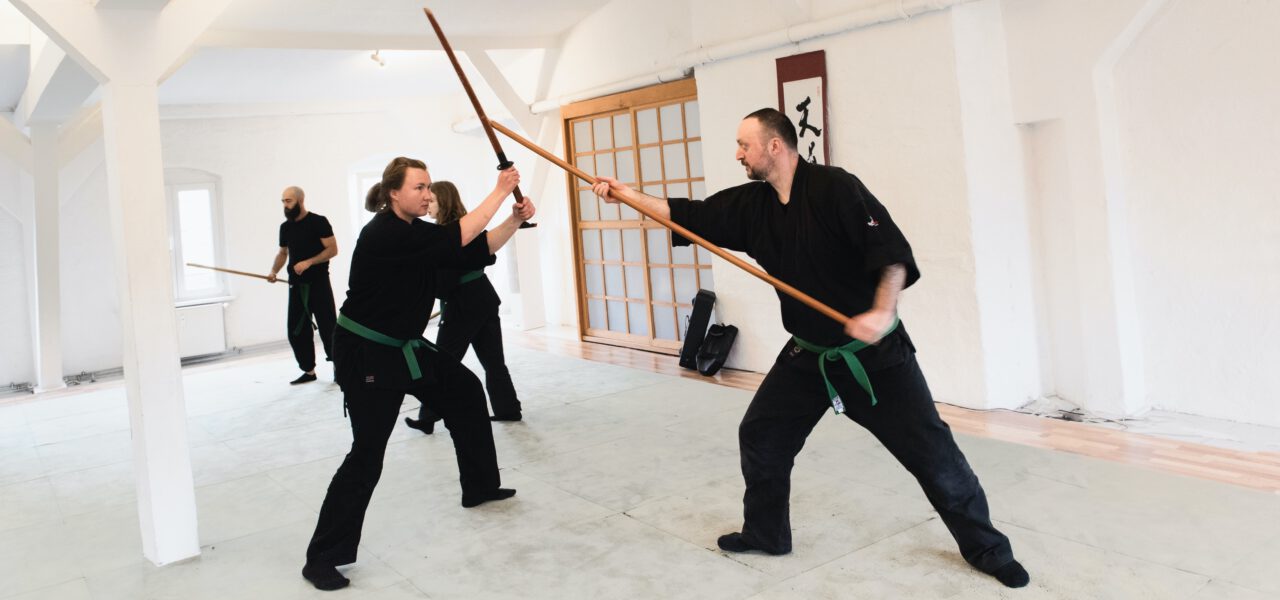»To me, Ninjutsu’s complexity and variability make it the most appealing of the martial arts. It’s an activity that can accompany you throughout your lifetime, because physical strength and fitness are far less important than a knowledge of timing and distance, and a feel for your own body and that of your opponent. It’s not a competition. It’s about having the ability to size up a situation, and yourself, and reacting appropriately. The basic idea of recognising principles allows you to react to an unlimited number of situations – not only situations involving physical conflict, but also situations which you can encounter in everyday life (for example, in your career, in conversations, self-recognition, and personal safety). Philip provides you with all the knowledge required in a relaxed atmosphere. As well as regular training, it’s also possible to take part in a variety of different weekend seminars, many of which even attract participants from other countries. These lead to extraordinary experiences, and allow you to build up a wide network of contacts and friends«.
– Anna (32), architect.
»It’s been three years since I came across Philip’s training, without any prior knowledge of martial arts. Words like “ninja”, “secret”, “weapons” and even “deadly” that you often see on the internet are what first attracted me. In that sense, my expectations were inaccurate: ninjutsu is far more than these things. I started practising it as a martial art, intending to learn how to protect myself and my friends. That’s still the case today, but I feel like my conscience has been attuned to the environment and my temperament has become calmer. That’s all thanks to Philip: his very personal method of teaching keeps a good balance between traditions and modern practices. He makes ninjutsu what it should be: an art«.
– Stephan (21), video artist.
»One of the reasons that I like ninjutsu so much is that you don’t only learn techniques. It’s far more important to learn principles (for example, how to recognise an opponent’s weakness and exploit it). I’ve learned some other martial arts as well, and to me, Philip’s training is special because it’s not only very well structured, but also very varied. Last but not least, the very open and friendly atmosphere, and the friendly people, also play a very important role«.
– Julia (28), human resources officer.
»I’ve tried out quite a few things in my time: judo, tae kwon do, capoeira, and lots of styles of ju-jitsu. But I was always dissatisfied by them. The focus was always on the athletic aspects: tournaments, stress tests, workouts. What I actually wanted to learn – effective self-defence in the world which surrounds me every day – was something that was mostly left to one side, and occasionally touched upon in special training sessions. All of this means that I very rarely stuck at it for more than a year. This was the reason that my first ninjutsu training session was an epiphany: it’s a martial art which unrestrictedly covers all aspects of self-defence that you can imagine. An ancient and fascinating tradition which is still highly relevant today. Training sessions take place in a pleasant, relaxed atmosphere: nobody is forced to do anything, and there are no military-style drills or strict hierarchies – just mutual help and respect. And ninjutsu isn’t only limited to combat: the strategies which you learn in training, body awareness, self-confidence and the generally positive attitude towards learning and training are just some of the aspects of the training that also have everyday relevance for me. I’ve been doing ninjutsu for a few years now, and I can’t imagine a life without it«…
– Max (30), doctor.
»Ninjutsu is a very multi-faceted martial art which doesn’t only teach you a lot about your own physical and mental limits, sometimes showing you how to expand them. It also teaches you to use your own abilities in order to stay in control of difficult situations. What I especially like about it is that you’re never under any pressure to compete with anyone; instead, you have time to develop yourself. At the beginning, I was surprised by how little energy you need to overpower opponents who are much bigger and stronger than you are. Ninjutsu has given me a positive competitive spirit which is easily transferable to everyday life. Philip’s training sessions are very varied and interestingly structured. As well as training with modern and traditional weapons, we also perform taijutsu, where you can express your own experiences and wishes, and learn how to apply techniques to concrete situations«.
– Tobias (21), apprentice physiotherapist.
»Ninjutsu has a deeper meaning, and its historical importance in early Japan was what attracted me, What I especially like is the way that Philip doesn’t put any pressure on us. This allows us to work slowly, in peace, on techniques which look difficult to begin with. Since I started doing ninjutsu, I’ve become more self-confident in life, and I’ve got better at judging difficult situations that I was before. I’m happy that I started doing ninjutsu, because somehow I get the feeling that I’m growing with it«.
– Horst (17), student.
